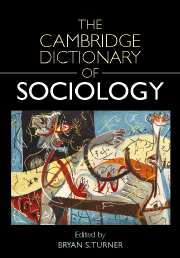J
Published online by Cambridge University Press: 22 October 2021
Summary
James, William (1842–1910)
An American psychologist and philosopher, James was the founder of pragmatism. Born in New York City, unconventionally educated in America and Europe and a qualified MD, James never practiced medicine. He started his career at Harvard, first as Instructor in Physiology and Anatomy, and, at different times, Professor of Psychology and Professor of Philosophy. Of the books published in his lifetime, the most enduring and of interest to sociology include The Principles of Psychology (1890), The Varieties of Religious Experience (1902), and Pragmatism (1907). All are still in print.
James’s influence in sociology is through a number of routes. The Principles of Psychology includes a chapter, “The Consciousness of Self,” that is thoroughly sociological and strongly influenced both Charles Horton Cooley and George Herbert Mead. James proposes the notion of a social self, later elaborated by Cooley as the looking-glass self, and also the distinction between the I and the Me, later developed by Mead. Through his influence on Mead, James contributed to the emergence of symbolic interactionism. But this is not the only route through which James enters sociology. James was also a source and inspiration for Thorstein Veblen, especially in the conception of human evolution directed by consciousness and also the characteristic Jamesian understanding of human instinct, both of which featured in Veblen’s evolutionary approach in economic sociology. Additionally, James’s discussion of religion (1902) was much more important to both Max Weber’s The Protestant Ethic and the Spirit of Capitalism (1905 [trans. 2002]) and Émile Durkheim’s The Elementary Forms of the Religious Life (1912 [trans. 1954]) than a mere index check could reveal. JACK BARBALET
Jameson, Fredric (1934– )
Professor of Comparative Literature at Duke University, cultural critic, and the key exponent of Marxist postmodern theory and interpretation of contemporary cultural trends, Jameson is best known for his Postmodernism or the Cultural Logic of Late Capitalism (1991), and his broad, innovative, and radical cultural criticism, especially The Cultural Turn (1998). Postmodernism, according to Jameson, represents a new mode of representation, life experience, and aesthetic sensitivity, all of which reflect the latest stage of capitalist development.
- Type
- Chapter
- Information
- The Cambridge Dictionary of Sociology , pp. 310 - 311Publisher: Cambridge University PressPrint publication year: 2006



